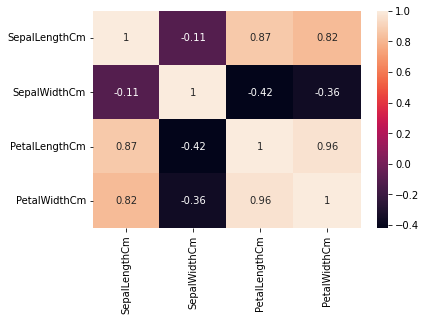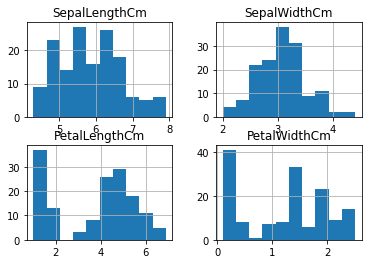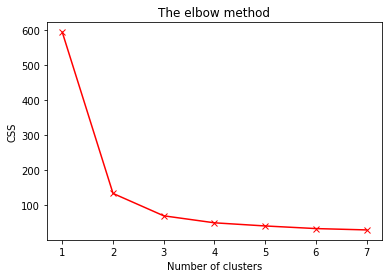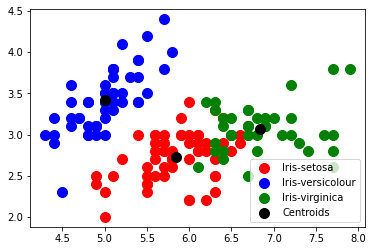K-Means Clustering (Tugas 5)
Contents
K-Means Clustering (Tugas 5)#
Import Library#
import numpy as np
import pandas as pd
import matplotlib.pyplot as plt
from sklearn import datasets
import seaborn as sns
from sklearn.cluster import KMeans
Ambil data#
%cd /content/drive/MyDrive/datamining/tugas/Iris/
/content/drive/MyDrive/datamining/tugas/Iris
df = pd.read_csv("Iris.csv")
df.head()
| Id | SepalLengthCm | SepalWidthCm | PetalLengthCm | PetalWidthCm | Species | |
|---|---|---|---|---|---|---|
| 0 | 1 | 5.1 | 3.5 | 1.4 | 0.2 | Iris-setosa |
| 1 | 2 | 4.9 | 3.0 | 1.4 | 0.2 | Iris-setosa |
| 2 | 3 | 4.7 | 3.2 | 1.3 | 0.2 | Iris-setosa |
| 3 | 4 | 4.6 | 3.1 | 1.5 | 0.2 | Iris-setosa |
| 4 | 5 | 5.0 | 3.6 | 1.4 | 0.2 | Iris-setosa |
df.tail()
| Id | SepalLengthCm | SepalWidthCm | PetalLengthCm | PetalWidthCm | Species | |
|---|---|---|---|---|---|---|
| 145 | 146 | 6.7 | 3.0 | 5.2 | 2.3 | Iris-virginica |
| 146 | 147 | 6.3 | 2.5 | 5.0 | 1.9 | Iris-virginica |
| 147 | 148 | 6.5 | 3.0 | 5.2 | 2.0 | Iris-virginica |
| 148 | 149 | 6.2 | 3.4 | 5.4 | 2.3 | Iris-virginica |
| 149 | 150 | 5.9 | 3.0 | 5.1 | 1.8 | Iris-virginica |
data = df.drop(columns=['Id'])
Shape data#
data.shape
(150, 5)
data.describe()
| SepalLengthCm | SepalWidthCm | PetalLengthCm | PetalWidthCm | |
|---|---|---|---|---|
| count | 150.000000 | 150.000000 | 150.000000 | 150.000000 |
| mean | 5.843333 | 3.054000 | 3.758667 | 1.198667 |
| std | 0.828066 | 0.433594 | 1.764420 | 0.763161 |
| min | 4.300000 | 2.000000 | 1.000000 | 0.100000 |
| 25% | 5.100000 | 2.800000 | 1.600000 | 0.300000 |
| 50% | 5.800000 | 3.000000 | 4.350000 | 1.300000 |
| 75% | 6.400000 | 3.300000 | 5.100000 | 1.800000 |
| max | 7.900000 | 4.400000 | 6.900000 | 2.500000 |
Data Visualization#
sns.heatmap(data.corr(), annot = True, linecolor='black')
<matplotlib.axes._subplots.AxesSubplot at 0x7fa688144190>

data.hist()
plt.show()

# Settin the data
x=data.iloc[:,0:3].values
css=[]
# Finding inertia on various k values
for i in range(1,8):
kmeans=KMeans(n_clusters = i, init = 'k-means++',
max_iter = 100, n_init = 10, random_state = 0).fit(x)
css.append(kmeans.inertia_)
plt.plot(range(1, 8), css, 'bx-', color='red')
plt.title('The elbow method')
plt.xlabel('Number of clusters')
plt.ylabel('CSS')
plt.show()

Applying K-Means Classifier#
#Applying Kmeans classifier
kmeans = KMeans(n_clusters=3,init = 'k-means++', max_iter = 100, n_init = 10, random_state = 0)
y_kmeans = kmeans.fit_predict(x)
Visualizing the clusters#
kmeans.cluster_centers_
array([[5.84655172, 2.73275862, 4.3637931 ],
[5.006 , 3.418 , 1.464 ],
[6.83571429, 3.06428571, 5.6547619 ]])
# Visualising the clusters - On the first two columns
plt.scatter(x[y_kmeans == 0, 0], x[y_kmeans == 0, 1],
s = 100, c = 'red', label = 'Iris-setosa')
plt.scatter(x[y_kmeans == 1, 0], x[y_kmeans == 1, 1],
s = 100, c = 'blue', label = 'Iris-versicolour')
plt.scatter(x[y_kmeans == 2, 0], x[y_kmeans == 2, 1],
s = 100, c = 'green', label = 'Iris-virginica')
# Plotting the centroids of the clusters
plt.scatter(kmeans.cluster_centers_[:, 0], kmeans.cluster_centers_[:,1],
s = 100, c = 'black', label = 'Centroids')
plt.legend()
<matplotlib.legend.Legend at 0x7fa684e05990>


